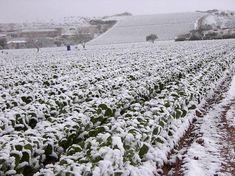
Snowfall and the coldest temperatures in up to 70 years this December are likely to play havoc with fruit and vegetable production and supply across Europe and into north Africa.
January could bring respite and be more in line with recent seasonal averages, but experts predict temperatures will plummet again in February.
The French meteorological office forecast the coldest December on record since 1950 - or possibly 1933. Temperatures will fall below -10°C in the north of Europe and in some cases as low as -15°C. There are also likely to be frosts in southern Spain and as far afield as Turkey, Cyprus and Morocco. Precipitation is expected to be in line with normal levels although much of this will fall as snow.
The Met Office in the UK is slightly more reserved, predicting “a drier and colder than average winter”, but a spokesman said: “Parts of the UK, especially southern regions, are expected to have temperatures well below normal.”
The implications for the industry could be huge. “It looks horrendous,” said Peter Davis of Davis of Louth, who has been in contact with the met authorities in France, Germany, the UK and Italy. “We could have temperatures as low as -15°C in Kent and Lincolnshire.
“Brittany could see snowfall like it has never seen before and temperatures are also forecast below freezing in northern Italy. With the cold and the cloud coverage there will be a shortage of peppers, cues, tomatoes, broccoli and courgettes from the south of Spain and even Morocco. It is forecast to go down to -5°C at night in Valencia. There is not a lot we can do. We have tried to prepare our customers in advance that this is coming so we probably will not be able to supply consistently throughout the winter.”
The forecasts come as Spain recovers from its last bout of frost damage. “After what happened this year, some growers and co-ops have been investing in heating systems,” said a spokeswoman for Coexphal, which represents grower-exporter co-ops in Almeria. “The costs will be much higher, especially given the price of fuel, but faced with 100 per cent losses otherwise, may of them have taken this option. Others have insured their crops, but there are still some that just take the risk. It is nature itself that will decide whether they remain in business or not.”
In Valencia, growers’ associations already describe their sector as in crisis. “It is a crisis of profitability that is very acute.Each year there is more pressure on price at the expense of the grower. The frosts earlier this year were ruinous. Any more will be a disaster,” said a spokesman at Ava-Asaja.
In Brittany, growers of cauliflower for the UK market realise there is little they can do but hope for the best. “Cauliflower can resist temperatures of -4°C or -5°C but at -8°C the product just freezes in the field,” said Pol Seite of Sicagri Bretagne. “In December we are at the height of production. If it snows first, the snow will give some protection to the crop but without the snow it will be a catastrophe.”



